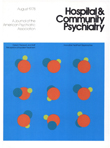Literacy Skills of Long-Term Hospitalized Mental Patients
Abstract
The authors tested 48 patients who had lived in a state psychiatric hospital for extended periods to determine their literacy levels. Measures used were the reading test portion of the Adult Basic Learning Examination (ABLE) and selected questions from the Adult Performance Level (APL) test, which attempts to assess competencies necessary to function effectively in society. Nearly half of the patients scored at the fourth-grade level or below on the ABLE, and their scores on the APL were well below norms for other groups. No correlation was found between number of years of hospitalization and test performance. From the findings the authors conclude that both in-hospital and aftercare programs must recognize that literacy level is an important factor in the rehabilitation or recidivism of patients.
Access content
To read the fulltext, please use one of the options below to sign in or purchase access.- Personal login
- Institutional Login
- Sign in via OpenAthens
- Register for access
-
Please login/register if you wish to pair your device and check access availability.
Not a subscriber?
PsychiatryOnline subscription options offer access to the DSM-5 library, books, journals, CME, and patient resources. This all-in-one virtual library provides psychiatrists and mental health professionals with key resources for diagnosis, treatment, research, and professional development.
Need more help? PsychiatryOnline Customer Service may be reached by emailing [email protected] or by calling 800-368-5777 (in the U.S.) or 703-907-7322 (outside the U.S.).



